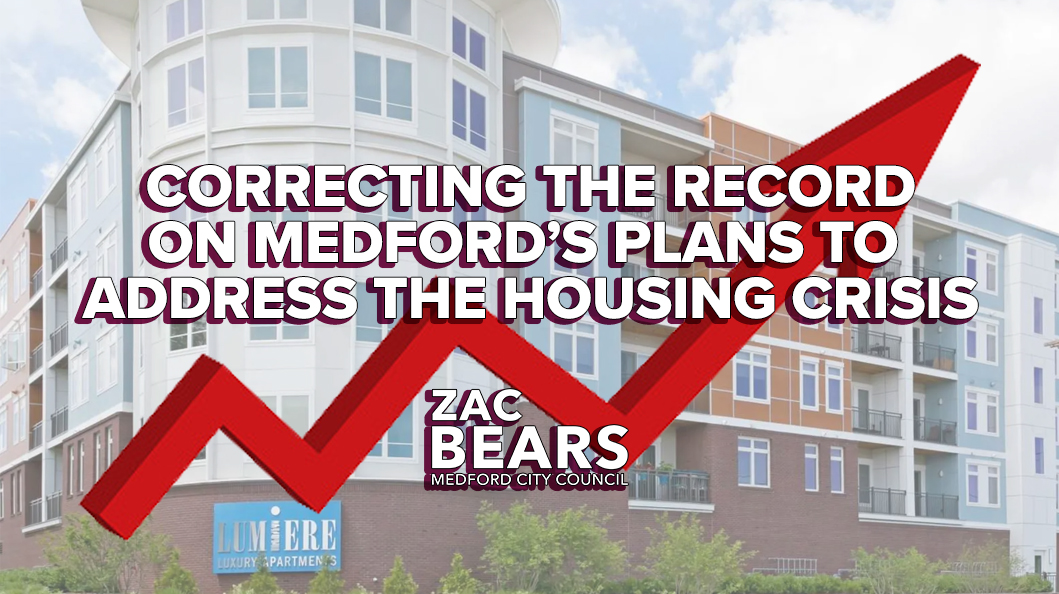Correcting the Record on Medford’s Plans to Address Housing Crisis
The city is taking a comprehensive approach to housing issues. Ignore the misleading corporate talking points that say otherwise.
Dear neighbors,
Many people in the city recently received a misleading and fearmongering text message about housing policy. I want to correct the record about the misinformation that is being spread by big corporate real estate interests who are opposed to the City of Medford and City Council’s work to address the high cost of housing that is forcing our families, friends, and neighbors out of our community.
I am particularly proud of the comprehensive work that all parts of city government are doing to pass Stable Homes for All policies that will make our Medford community stronger.
The City Council and city planning staff are working on zoning reforms to allow more housing to be built, reduce permitting and regulatory burdens for private property owners, encourage major economic development, and require construction of more subsidized Affordable Housing Units. We are also working on policies to benefit good landlords, like the Good Landlord Tax Credit.
The final piece of that comprehensive approach is anti-displacement policies targeted at the large corporations who are buying properties, jacking up rents, and earning a huge profit by kicking out long-time residents and making naturally-affordable units too expensive for the average person.
The misleading text message falsely stated that anti-displacement policies would financially harm families, harm housing construction, and hurt the economy. The factual corrections are below:
(1) Rent stabilization and transfer fee proposals would not impact owner-occupied 1, 2, and 3 family homes
- While specific proposals have yet to be fully drafted or finalized, City Councilors have made it clear in public meetings and online discussions that the proposed rent stabilization and transfer fee policies would not include owner-occupied 1, 2, and 3 family homes.
- The proposed policies are designed to address the large corporate property owners who are gambling and speculating with people’s homes and jacking up prices to maximize corporate profits.
- In fact, the City Council wants to pass a tax cut policy for small landlords with low rents so they can save some money for doing the right thing.
- The goal of both of the above policies is to address the developer and corporate transactions that are driving up the price of housing, not to impact small landlords who are renting out additional units in the buildings they live in.
(2) Rent stabilization does not hurt housing construction
- Studies and evidence actually show that rent stabilization policies are not an evil boogeyman that hurts housing construction, and that the policies simply help protect residents from displacement due to massive rent increases. (https://www.cssny.org/news/entry/testimony-rent-stabilization-regulating-rents-in-massachusetts | https://peoplesaction.org/wp-content/uploads/Economist-Sign-on-Letter_-FHFA-RFI-Response-1.pdf | https://www.sciencedirect.com/science/article/abs/pii/S0264275115001122)
- In 1994 when corporate interests and rich suburban voters decided to end rent control for Boston, Cambridge, and Brookline (against the wishes of the voters in those cities), studies showed that rent control “had little effect on the construction of new housing.” (https://www.sciencedirect.com/science/article/abs/pii/S0094119006000635)
- Even the most committed opponents of rent stabilization and rent control concede that it does prevent displacement of local residents. While it is not on its own a solution to our housing crisis, it is a part of the solution, especially in the short-term while we build more homes. That is how the City Council is considering it as we also move forward with many other policies that will help increase housing supply, work regionally with our neighboring cities, and address the long term causes of this housing crisis. (https://www.vox.com/22789296/housing-crisis-rent-relief-control-supply)
(3) Rent stabilization and transfer fee proposals require state approval and local public process
- Both the proposed rent stabilization policy and transfer fee policy require the approval of the state house, state senate, and governor on Beacon Hill before the City Council can consider them. There is still a long road before either policy can take effect. https://www.mass.gov/doc/home-rule/download
- If the state provides permission, there will be many local meetings where the public can participate and we can work together to make sure the policies are targeted as intended at the large corporations who are displacing Medford residents and turning Medford homes into speculative investments to maximize their profits.
Thank you for your time reading this. Please email the Mayor and City Council in support of these policies at mayor@medford-ma.gov and ccmembers@medford-ma.gov.
I encourage you to share this message widely to help correct the record about how your local government is working hard to address the housing crisis that is so harmful to our community.
Sincerely,
Zac Bears
President
Medford City Council

